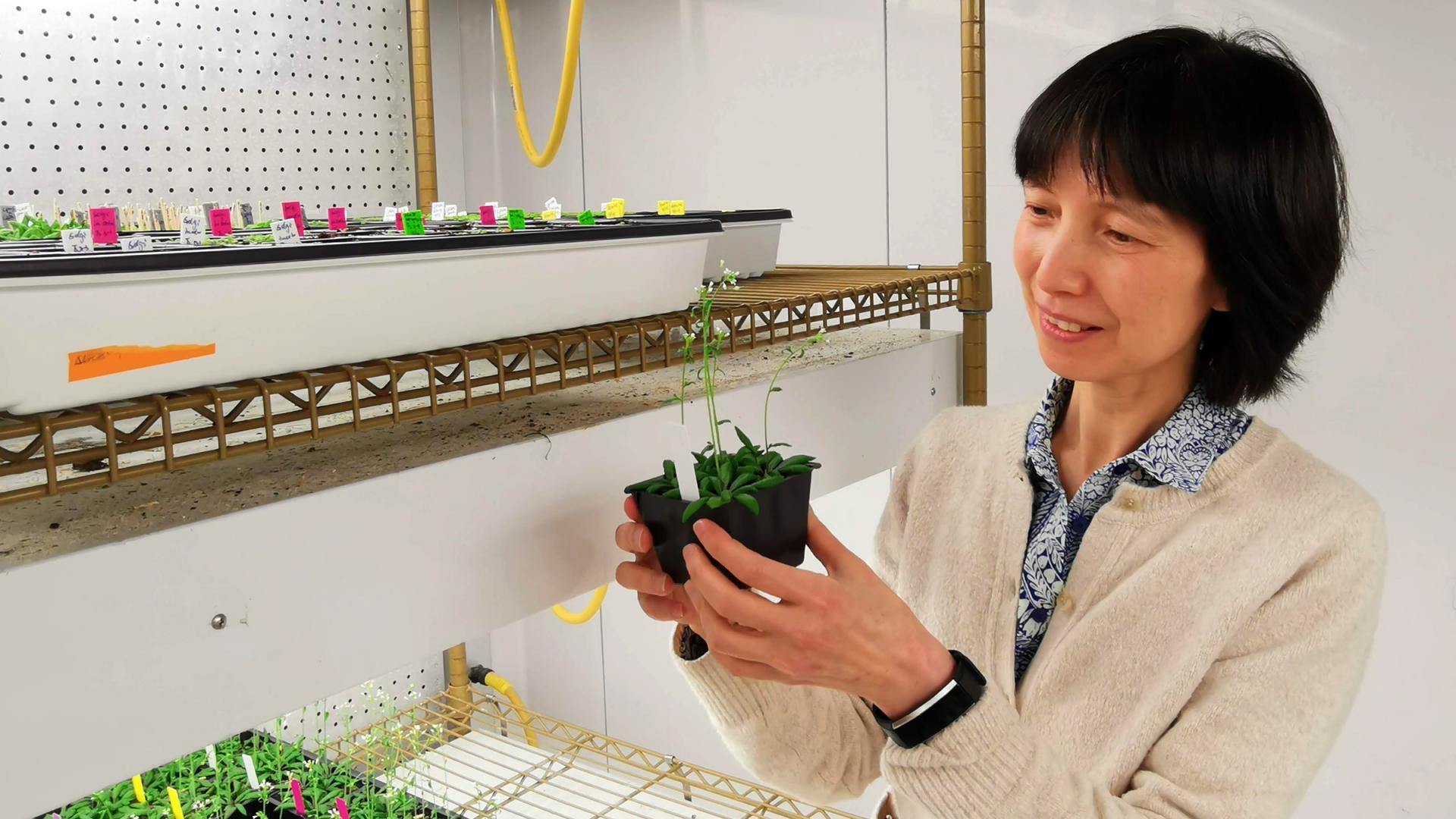Jian Hua is a professor in the Plant Biology Section of the School of Integrative Plant Science. Her discoveries of how temperature and other environmental factors affect plant growth and immune response provide fundamental guidance for developing resilient crops to weather climate change. We recently asked her how she came to these insights.
Have you always had an affinity for plants?
In elementary school, I took care of the plants on the balcony and inside our third-floor apartment in Nanjing. I liked to grow all sorts of houseplants and flowers. Succulent plants made an impression on me because their look changes depending on how you take care of them. They may have triggered my curiosity on how the environment affects plants. I also liked moss roses for their diversity of flower color and leaf shape. I dreamed someday I could design my own plants with different colors and shapes.
You followed your interest in plants in school?
I majored in biology at Fudan University in Shanghai and then started doing my first plant research while working on a master’s at Shanghai Institute of Plant Physiology. I investigated the regulation of the Waxy gene that controls what kinds of starch rice produces – which is very important if you’re trying to grow “sticky” rice.
During that time, I read the book A Feeling for the Organism: The Life and Work of Barbara McClintock. [McClintock ’23, M.A. ’25, Ph.D. ’27, won the 1983 Nobel Prize in Physiology or Medicine.] At the time, I didn’t fully understand the her research. But her dedication to her work and her way of living were very inspiring.
I never thought I would come to Cornell where she studied and worked.
You came to the U.S. after finishing your master’s?
I realized that I needed to come to the U.S to further my studies because the U.S. was the pioneer in biological research.
I was fortunate to get into the California Institute of Technology. There, I studied the receptor genes of ethylene gas, which controls fruit ripening and other phenomena in plants.
This early molecular genetic work on revealing the mode of action of receptor genes significantly advanced the plant hormone field, and inspired other researchers to use similar approaches.
How has that early work informed your current work?
I started thinking more about how the environment affects plants. One of the key environmental factors that affect plants is temperature. There had been work on how plants respond to extreme temperatures. But there was very little study on how moderate temperature changes affect plants and how plants sense temperature in general.
What has been your most significant discovery since coming to Cornell?
We found that temperature affects plant immunity, the system plants use to fend off diseases. This realization came as a surprise from a genetic study of a temperature sensitive dwarf Arabidopsis mutant used as a model. The study revealed that a moderate increase of temperature could suppress plant immunity, making a healthy plant susceptible to disease.
Subsequent studies showed that plant immune receptors and the plant hormone salicylic acid are among the keys for temperature sensitivity of plant defense responses. We uncovered specific genetic variations that could make a plant resistant to a pathogen even when temperature rises.
The interplay between temperature and plant immunity is very complex. The outcome of altered temperature on plant defenses depends on the genetic makeup of plant and pathogen, and other environmental factors such as humidity and light.
I also learned that there are probably no simple universal receptors or sensors for temperature (unlike ethylene). Temperature has large and diverse effects on many processes in plants and every biological process might have its own temperature sensor.
The very immediate application is perhaps in breeding plant varieties that are more resilient in the face of an increase in temperature extremes due to global climate change.
Why is your line of research important?
The very immediate application is perhaps in breeding plant varieties that are more resilient in the face of an increase in temperature extremes due to global climate change.
If we know which genes are controlling temperature sensitivity in plant growth, development and immunity, we can more quickly develop crop plants with the right combination of gene variants so that they can stand up to temperature variations and extremes.
Is that why you got into plant research in the first place?
Not really. I was interested in plants and wanted to figure out how they work. Nowadays, the immediate impact of research is often emphasized. But we shouldn’t undermine basic discovery. Fundamental research is critical because you never know which discoveries will have a big impact in the future.
Do you still grow plants for fun?
I still love growing plants and do a little bit of gardening. But not as much as I’d like to because of lack of free time. Maybe I will do more when I retire. But for now, I like to visit gardens such as the Cornell Botanic Gardens and enjoy plants that way.
Header image: Banner: Jian Hua checks on Arabidopsis plants. Photo by Zhan Li.





